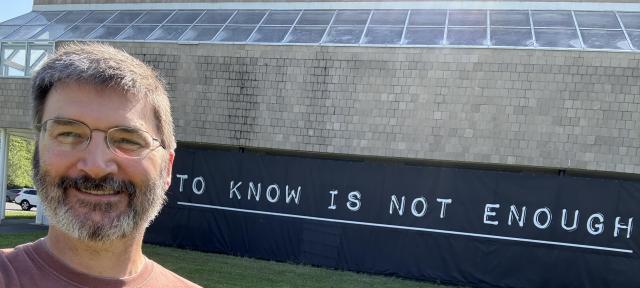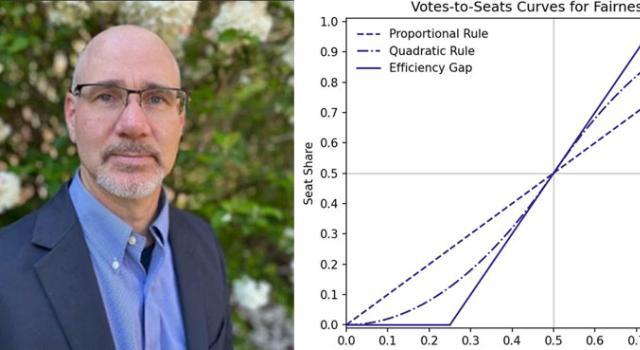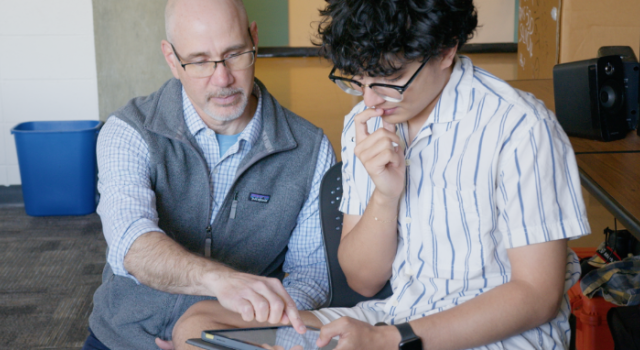Alum Gordon Williams 89F Credits Hampshire for Love of Math

Alum Gordon Williams 89F, who recently returned to campus to teach at Hampshire College Summer Studies in Mathematics (HCSSiM), is a professor at the University of Alaska Fairbanks and the editor of Mathematics Magazine.
Williams is a discrete geometer: that is, he studies geometric objects, or shapes, that are described in terms of their distinct component parts. We caught up with him recently to discuss his experience teaching at HCSSiM and how his Hampshire experience impacted his career.
What are you most proud of in your work?
This is a question that feels a little bit like asking which of my children is my favorite. On the research side, that’s a moving target. It varies between some of my papers I feel had the best ideas — the ones I continue to refer back to in later work — and whatever I’ve done most recently. On the teaching front, it’s always about the students I think I’ve had the most personal impact on, which usually happens when I get to meet with them one on one about what they’re struggling with.
This year’s HCSSiM was the best teaching experience of my career. I got to work with a stellar group of young people in a very intense setting. As someone whose teaching involves a significant number of students who are enrolled because they’re required to take the class, it was one of the very few times in my career when every student was there solely because they wanted to be. It also meant I got to do some teaching in a very Hampshire College kind of way, meaning:
- It was framed around interesting questions and where the students wanted to go with the material. Normally, I have to worry about hitting a fairly prescriptive list of content, which can very much limit the spontaneity and give-and-take that are possible in a classroom. In this case, the goals were more skill- than content-based, so we could frame our discussions and work around how students responded to material.
- I was never grading student work; I was simply providing feedback that they could use to improve their future work. Normally, I’m lucky if students look beyond the score they receive, and they frequently view the marginal remarks as a justification for the score, not advice.
- I got to work with students through a process of self-reflection and self-assessment.
- I had a great team of colleagues to work with, who were generous with their time, energy, and insight.
Teaching felt like improvisational jazz: dynamic, active, interactive, reactive, responsive, supportive, playful, and joyful — a team effort on the part of the instructional staff and the students.
"I’m not sure I would have found mathematics if it weren’t for Hampshire. Ken Hoffman and David Kelly did a great job of setting me up to appreciate how much fun mathematics could be."
What originally drew you to Hampshire?
I went to an alternative public secondary school that emphasized student autonomy and self-directed learning, so that was something that was super appealing to me in the colleges I was looking at and for. Hampshire also had the Five Colleges, so I felt like I didn’t have to worry about finding courses that met my needs or other academic resources. Both of these things turned out to be true, as I took classes at Mount Holyoke, Smith, and UMass and spent countless hours in the various libraries and attending talks and events throughout the Pioneer Valley.
In what ways did your time at Hampshire influence your life or career?
I’m not sure I would have found mathematics if it weren’t for Hampshire. Ken Hoffman [professor emeritus of mathematics and natural history] and David Kelly [professor emeritus of mathematics and director of HCSSiM] did a great job of setting me up to appreciate how much fun mathematics could be, and supported me through my evolution from wannabe physicist to budding mathematician.
It started with taking Calculus in Context and Math and the Other Arts from Ken, and being given both tools and open-ended problems and questions that sparked my imagination and led to me spending a lot of time running experiments on the computers in the lab. David’s weekly talks on a wide range of interesting and weird things you could do with mathematics, accompanied by cider and cider doughnuts, gave me a community of friends at Hampshire who were also mathematically inclined and a lot of fun things to puzzle about.
It also began to sink in that mathematics was a discipline in its own right, not just something physicists developed as needed to make the theory work, and that as much as I liked physics, it was often the mathematics that was really holding my attention. Through their teaching and mentorship, they showed me the many ways good math was fun, and beautiful, and that when it was challenging, that could be part of the fun.
Is there anything else you’d like the Hampshire community to know?
Hampshire needs their support, both personally and financially. Progress happens through people getting skin in the game and extending grace to each other and working together for the things we agree on while putting up with the things we don’t. If we want there to be any version of Hampshire still around in 20 years, even a less than perfect one (and what human institution is perfect?), now is when we should be stepping up.



